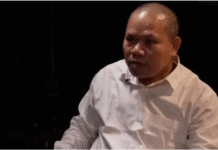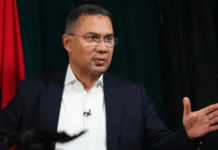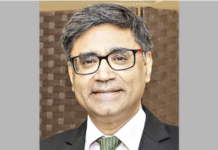
Interim government’s law adviser Asif Nazrul on Thursday said that Bangladesh will formally ask India to hand over ousted prime minister Sheikh Hasina to stand trial.
‘Bangladesh signed an extradition agreement with India in 2013. We will request the Indian government to return the former prime minister,’ he said at a press conference at Foreign Service Academy.
The press conference was arranged to brief media about the meeting between chief adviser Muhammad Yunus and chief of different reform commissions formed in the past week to reform six sectors including constitution, judiciary, Election Commission, Anti-Corruption Commission, police and public administration.
Hasina fled to India on August 5 in the face of a student-led mass protest. Although India has confirmed that it is hosting her, Delhi has kept mum on her whereabouts.
Dhaka has previously expressed its intent to seek her extradition.
Nearly 800 people were killed and thousands were injured during the protest that toppled Hasina and banished Awami League from power.
She has since been accused in over 100 cases.
Responding to a question on Sheikh Hasina, Asif Nazrul said Bangladesh has an extradition treaty with India and can ask to extradite under the treaty if anyone is convicted.
‘We will quickly inform you through the law ministry that we have taken some steps to prosecute over the massacres and crimes against humanity committed during the student movement. By this time, some steps already were taken, the chief prosecutor of the International Crimes Tribunal has been appointed. The court will be reconstituted soon,’ he said.
About Thursday’s meeting, Asif Nazrul said that the main discussion was on reform ideas that how the commissions want to work on, what will be the procedure, the process of selection of members and when would they submit report.
He said that there was a consensus on some issues in the meeting and the commissions will start working by October 1.
He said that the commissions hope to submit their reports by December 31.
‘Based on their reports, in the second phase, the advisory council will start discussing reform ideas with political parties. Then there will be discussion in a larger scale, with people from all walks of life,’ he said.
The reports of the commissions will be made available online, he said adding that an attempt will be made to reflect everyone’s views.
‘The expectation of the student uprising was not limited to elections. It was a question of reforming the state and the dream of establishing true democracy. The reform commissions had initially started working with the aim of what reforms are needed to prevent the rise of fascist rule in Bangladesh ever again,’ he said.
Regarding the reason for the formation of the commissions, Mahfuz Alam, a special assistant to the chief adviser, said that the people of the country had suffered under the fascist regime for a long time.
He said that the proposal to form more reform commissions is on the table later.
About the meeting, several commissions chief told New Age that the meeting decided that the commissions would work independently and they would include other members of the respective commissions in their own choice.
They said the commissions are likely to have seven to nine members.
Badiul Alam Majumdar, who leads the Election Commission reform commission, chief adviser’s press secretary Shafiqul Alam, deputy press secretaries Abul Kalam Azad Majumder and Apurba Jahangir were present.
New Age









